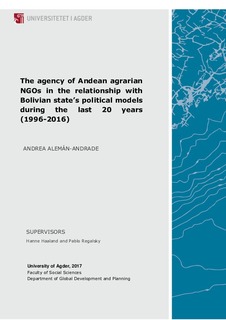| dc.description.abstract | Bolivia changed its state model in 2006 with the entrance of Evo Morales to the presidency. He assumed the presidency representing indigenous, peasant and social movements. The country had a new constitution in 2009 that included different cultures and indigenous nations. However, the regulatory framework changed its focus. For instance, in 2011 the Communal Agrarian Productive Revolution law was enacted, so as the Patriotic Agenda 2025 in 2013. The laws carried a new conception of the state related to the increase in the production and exportation of natural resources. This model has been called “commodities consensus”.
With the change of the national state models, there is a change in the relationship of the state with the civil society, and in this specific case of study, in the relationship with the NGOs. Through a qualitative research strategy, the research aims to analyse the agency of Andean agrarian Non-Governmental Organisations (NGOs) in the relationship with Bolivian state’s political models (neoliberalism and post-neoliberal/commodities consensus) during the last 20 years, from 1996 to 2016.
The exercise of agency of the NGOs in their relationship with the state has taken two lines: “NGOs agency for reproduction”, applying the demands of the state and global civil society trends, and “NGOs agency for social change”, where NGOs have been working to support indigenous and peasant communities beyond the state. The major example of the exercise of agency for social change was the constitution of the Plurinational State of Bolivia. Currently, in the commodities consensus model, the state enforces NGOs to reproduce the official development model. The state wants to use the NGOs as instruments for its governmentality, with rigid laws that shows a regimen on the path towards authoritarianism. | nb_NO |

